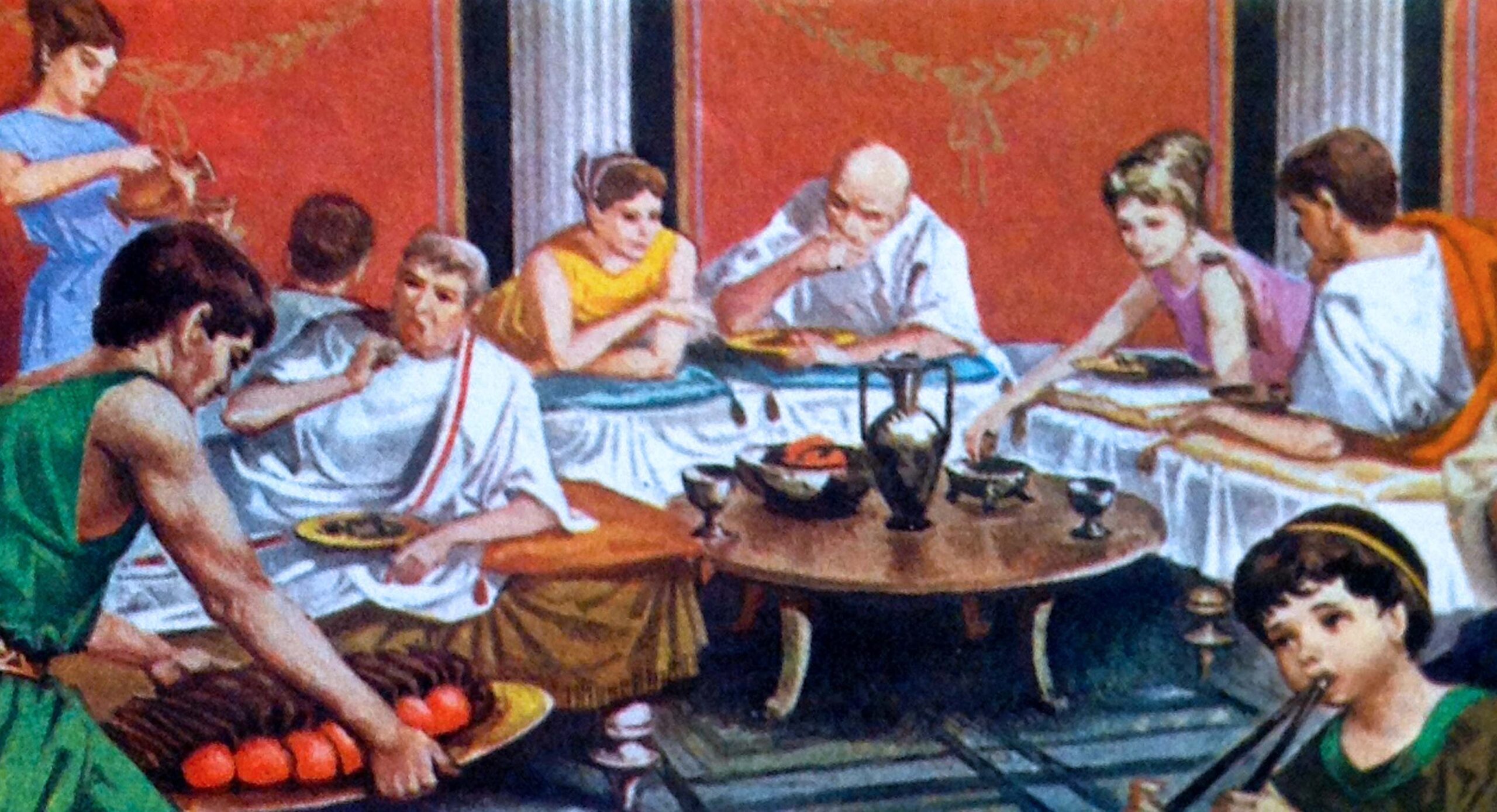rome's influence on dinner parties
Ancient Rome has had countless influences on the modern world and society in general, but few realize that some of the same rituals and concerns that we have today are rooted in the ancient world, namely – the dinner party.
Dinners in antiquity were almost always a social affair, shared with a few close friends at someone’s home. The ancient Romans believed that the ideal number of guests for a dinner party ranged from three to nine, but there was still much cause for debate even within this range. Some hosts believed that a small numbers of guests was preferable. The reasoning? Perhaps the same as today, more space for each guest and a lesser chance of running out of either food or (horror of horrors) wine! The great first century writer Plutarch even chimed in on the subject stating that even if there is plenty of space, food and drink, a smaller group is still better for conversation and social interaction.
For informal dinner parties a Roman host would usually extend a verbal invitation, for example, while lounging at the public baths. For larger or more formal events, messengers delivered hand-written invitations to guests. Numerous examples of such invitations have survived the centuries and today’s written invitations seem to mirror the formal tone taken by the Romans. To illustrate the importance of the event, a return response was requested. Sound familiar? Some invitations even made note of special provisions that might be necessary for the guest – “Let us know if you are coming by donkey, so we can have space in the stable.”
It seems that when it came to seating, the place of honor varied from region to region. For the Greeks, it was at the head of the gathering; for the Persian, the highest honor was to be seated in the center. Romans ate while lounging on couches arranged as a triclinium. Plutarch described that for Romans the place of honor was the “last place on the middle couch.” It seems reasonable as well as practical. That guest would be in the center of the conversation, but could still get up to use the facilities without disturbing others.
seating a dinner party
It seems that when it came to seating, the place of honor varied from region to region. For the Greeks, it was at the head of the gathering; for the Persian, the highest honor was to be seated in the center. Romans ate while lounging on couches arranged as a triclinium. Plutarch described that for Romans the place of honor was the “last place on the middle couch.” It seems reasonable as well as practical. That guest would be in the center of the conversation, but could still get up to use the facilities without disturbing others.
Then of course there is the questions of place cards for the dinner party. Every hostess and host have at some point enthusiastically debated the seating arrangement, most often based upon who absolutely cannot be seated together. So, you make a seating chart. To ensure that everyone knows that there is a seating chart, you will often put place cards out. If you have ever felt that this is a dilemma of modern times, think again. The same issue befuddled the Romans.
Plutarch discussed the philosophical merits of arranging the seating or leaving it up to the guests. Some felt that assigned seats should be based upon who will get along well with one another. But the more common reason cited for assigned seats was to show respect to a guest’s age and or social rank. It is a valid point – you would not want to seat a Senator too close to the vomitorium or place an important guest next to the family member whose lack of manners increases exponentially as their wine glass empties.
Others argued that the guests should decide for themselves where and with whom they are most comfortable sitting. Plutarch’s advice was to “separate contentious, abusive and quick-tempered men by placing them between some easy-going men as a cushion to soften their clashing.” Matching together guests whose personalities and interests complement one another was sound advice then and is sound advice today.
dinner party traditions
Roman dining rooms of the wealthy were lavishly decorated with frescos, mosaics, wall hangings and art objects. To add even more cache to the event, for example a wedding, flower petals were strewn on the floor. We find that the same custom still prevails at some nuptials. The reason behind the Roman practice would be lost on most guests today. They believed that it would protect guests from food poisoning! The Romans were also very superstitious and believed that any food that fell on the floor during a meal belonged to the gods and it was extremely bad form to sweep it up during dinner. Romans even decorated their dining room floors with mosaics depicting realistic-looking scraps of fallen food. Perhaps since the gods were looking down on the mortals, the piece of meat on the floor worked whether it was real or a tile facsimile.
The custom of throwing a pinch of salt over one’s shoulder for good luck is also based upon ancient times. Back then, salt was expensive. If some spilled on the table, the host would scoop it up and toss it on the floor for the gods. It was like getting bonus points.
The Romans did not use forks, but ate in as elegant a manner as possible with their fingers. Even this had some conventions attached. For example, etiquette required scooping up preserved fish using a single finger, but for fresh fish, one could use two, but not by pinching the piece between a finger and thumb! That was considered crass and ill-mannered. You had to use a two-fingered slide beneath the fish. Historians have recorded the technique, but not the reason. Your guess is as good as ours.
As far as conversation during dinner, Plutarch mentions that some of the classic ponderable mysteries are always good fodder to get the conversation going. These would include which came first, the chicken or the egg? Is it healthier to eat a wide variety or food or stick with what you know? Are there more delicacies found on land or in the sea? Obviously anyone can have an opinion on those topics, but no one’s opinion is likely to start an argument, unless some drunken guest (probably Plutarch’s brother-in-law) blurts out “Those are stupid questions!”
Weekly News – Aug 22, 2019
By the way, Plutarch’s reply was, “variety is more agreeable and that the more agreeable is the more appetizing and the more appetizing is the more healthful.” The response of Plutarch’s brother-in-law is not recorded, but was probably unprintable anyway…
Marcus Varro, the ancient Roman writer, scholar and man about town, suggested rules for the right mix of guests for dinner parties, “Do not invite either too talkative or too silent guests, since eloquence is appropriate to the courts and silence to the bedroom, but neither to a dinner.”
The social exchanges that occur over food and wine were as important to the ancient Romans as to us today. These dinner parties helped to create and maintain friendships and were as important to gain an understanding of others as they were to exchange ideas. Plutarch summarized: “A guest comes to share not only meat, wine and dessert, but conversation, fun and the amiability that leads to friendship.”
The ancient Romans even offered advice on how to improve conversation skills. Philosophers suggested that hosts should ask questions on a topic someone knows well to spark interesting conversation, such as travel and the customs of other lands to those who have traveled – a great conversation starter even today.
Humorous stories are another feature that is important at dinner parties, but it is also a case of knowing the audience. It would be in extremely bad form to tell a story that would embarrass a guest, but it is ideal if the story has a pithy ending. An example of one such story comes from Plutarch, who told of Mark Antony’s plan to impress Cleopatra with his skill as a fisherman. Prior to the fishing expedition, the Roman general had arranged for swimmers to attach fish to his line. While the two were seated on a barge in the Nile River, Mark Antony landed fish after fish. So successful was his catch that the poor swimmers, undoubtedly slaves, ran out of fish. After a rather unexpectedly long period without a catch, Mark Antony felt a weight on his line; however, the fish he landed was already dead and preserved with salt! Cleopatra’s response to this was along of the lines of “leave the fishing to others, your sport is conquering cities.”
Plutarch also counseled that jokes and witty stories should be spontaneous and never come across as previously prepared entertainment. To emphasize the point he stated, “the man who cannot engage in joking at a suitable time, discreetly and skillfully, must avoid jokes altogether.” In other words, if you can’t tell jokes – don’t! It is advice that was as relevant two thousand years ago as it is today.





